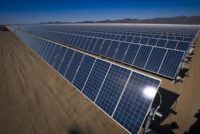“The manufacture of PV panels locally will have to be a nationwide investment as it would require billions of dollars,” says Alaa. He notes that, although there is a local company that assembles PV panels, product prices “are not competitive and nowhere near the Chinese prices.”
Cairo-based Sun Infinite Energy CEO Wael El Ezabi says Egypt solar-PV developers will continue to import solar panels until the North African country's capacity comes of age.
“You need to have a market first, and when you have a market of a substantial size, then you can start manufacturing a commodity, [such as] solar modules,” he says. “There is no chance of success for any manufacturing facility unless it has a minimum critical mass of demand, and that cannot be achieved unless you have a market.”
Leading international solar-panel makers, however, have made a foray into the South Africa market to take advantage of the country’s ambitious Renewable Energy Independent Power Producer Procurement Program. The program is an integrated resource plan that projects electricity supply and demand over 20 years, with a target to generate at least 42% of the country's electricity from renewable resources.
Yingli Green Energy already has executed a contract for the 96-MW Jasper solar-PV project in South Africa, one of the largest such projects in Africa. In partnership with South African firms Kensani Group and Intikon, EnergyYingli has supplied 325,360 solar panels for the $260-million project, developed by large-scale solar-energy developer SolarReserve.
In the second quarter of 2015, Yingli is expected to ship up to 750 MW to international markets; of that total, an estimated 40 MW to 60 MW will be shipped to downstream PV projects.
Canadian Solar, a top PV-panel maker, previously had picked Romano Group as its authorized panel reseller in South Africa. Romano is pushing the two configurations: module CS6P-P, which has 60 solar cells, and CS6X-P, which has 72 solar cells. Romano Group has a solar-PV division that operates as an EPC contractor for large-scale, ground-mounted rooftop systems and as a reseller of PV modules and inverters, according to South Africa solar-PV developers’ umbrella body, the South Africa Photovoltaic Association.
Analysts predict growth in the coming months of the solar-PV segment in Africa. Terje Osmundsen, senior vice president of independent solar-power producer Scatec Solar, Norway, in a recent article said, “A number of African governments and utilities now seem to have done their homework and are set to implement the first utility-scale solar projects.”
He predicts South Africa solar-power expansion will move fast because “the costs of have come down, especially for PV, where the average bidding tariff dropped by 68% between round one and round three.”
“The biggest surprise in 2015 may come from Cairo, where the government, led by Egyptian President Abdel Fattah al-Sisi, is attacking the country’s power crisis,” says Osmundsen.

